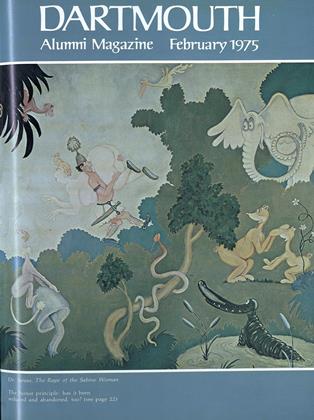THE idea for this new monthly column was borrowed from Newsweek's "My Turn," the Op-Ed page in TheNew York Times, and probably several other publications. The title was expropriated from a Dartmouth academic journal which didn't quite take flight ten years ago, although one diehard favored "The Northern Light," taken from a 19th century student publication. So much for originality.
The purpose of "Vox" is to provide a forum for ideas, opinion, amusements, and, as our 19th century forebears would say, the instructive arts. Contributions will usually be by invitation, and will be solicited from a wide circle of philosophers, which is to say everyone who has an interest in Dartmouth and education. The topics will usually, but not always, concern Dartmouth and education. We are not strict constructionists. Following an answer to questions-you-have-always-wanted-to-know-but-were- afraid-to-ask about the Board of Trustees, the next month there might appear a plan for building a better paper airplane. Although the stuffpots won't admit it, Dartmouth can be — is — a zany place; therefore, pedantry and hubris will not be at home in this column.
So much for the credo of "Vox." To borrow from Newsweek again, this time will be our turn.
Suddenly — surprisingly — people are talking about alumni magazines. These gray ladies of the publishing world number about 925, with a combined circulation of perhaps 15 million. Some of these magazines are better than others, which is the point of recent articles in The Nation and The New York Times. The good ones — The Nation puts the number at about 40 — have something to say and say it well. The good ones manage to achieve that fine balance of promoting the welfare of their institutions (else why should there be an alumni magazine?) and examining honestly the life of their institutions and life itself (else why a magazine at all?).
The business of a college is learning, and a proper alumni magazine will extend that ideal to its readers. For experimentation and achievement, zaniness and perversity (and, lord knows, adversity) there is no place quite like a college. "... Alumni magazines reflect a great deal about the internal affairs of the institutions they represent," commented The Nation. "If a university publishes a magazine cluttered with public relations puffery, chances are good that the institution's officers are (a) trying to hide something or (b) in desperate financial straits." An alumni publication, the article continues, "should be a vehicle for continuing education; the publication that functions as a house organ is bound to estrange its audience from the intellectual life of the institution." An article about stellar white dwarfs or a cover story on the golden age of motorcars or a disquieting commentary on the vanishing honor principle or a glimpse into the radical ideas of John Humphrey Noyes, 1830, to take examples from this and recent issues, tell us something about Dartmouth and education and ourselves. That is the ambition of this magazine.
The DARTMOUTH ALUMNI MAGAZINE will be 70 this October. Founded as the Dartmouth Bi-Monthly (the name changed in 1908), its first editor was Ernest Martin Hopkins, who not so many years later became President of the College. An editorial in the first issue stated, "The various questions intimately concerned with the growth of the College ought to be discussed openly by the alumni, with a view to the better understanding of them. ... The publication of this magazine is to be considered as an effort to realize in the most intelligent way the unity of the College." So the Magazine was founded on openness and understanding - "We deal with it by talking about it."
Through the editorship of Mr. Hopkins and his successors, most notably Charlie Widmayer '30, the ALUMNI MAGAZINE cultivated a sense of independence, at times a keen sense of independence. There have been times when the Magazine made the alumni very angry (sometimes for telling the truth) and times when it made the administration apoplectic. "A primary job of the Magazine is to keep the alumni fully informed ... and to give them an understanding of not only what the College is doing but why," Charlie Widmayer once wrote a Dartmouth fund-raiser. "Now to do that job the ALUMNI MAGAZINE has to be trusted ...," suggesting trust born of honesty and independence.
The ALUMNI MAGAZINE has been - is - independent in body as well as spirit. It is entirely self-supporting, meaning that everything from printer's bills to salaries to office furniture is paid for from subscription and advertising revenues, with no help from the College. The Magazine keeps its own accounts and pays its own telephone bill. (Until last year the four full-time members of the staff shared one telephone line; after a modernizing spree, we now have two.)
So much for hubris and pedantry. The title design above, by the way, shows the geometry of the paths crossing the Green.
"We deal with it by talking about it."
 View Full Issue
View Full Issue
More From This Issue
-
 Feature
FeatureStar Birth, Star Death, and Black Holes
February 1975 By DELO E. MOOK -
 Feature
FeatureHONOR: The Vanishing Principle
February 1975 By JAMES A.W.HEFFERNAN -
 Feature
FeatureThe Great Rip-off
February 1975 -
 Feature
FeatureSome People Are Good Skiers
February 1975 By V.F.Z. -
 Article
ArticleThe Gospel According to Marcus
February 1975 -
 Article
ArticleFurther Mention
February 1975 By J.H.










